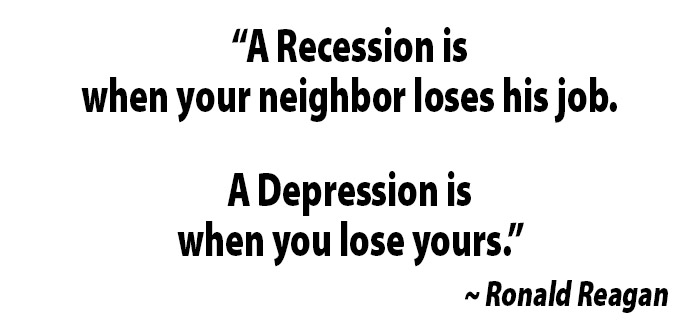It was one year ago that I recorded my inaugural podcast episode of Recession-Proof Your Retirement and what a year it was! At that time, our economy was booming and nothing in the horizon was going to slow it down…or so we thought. In this first recording, I shared how the word recession has become taboo in current times and although no one likes to think about markets heading south, I went on to explain that economic recessions have occurred all throughout the history and always will. I asked listeners what the chance was that we were heading into our next recession. My answer surprised many as I stated there was 100 percent chance as statistically, we are always heading into a recession as we average one every 8.8 years. I then asked: “When will the next one occur?” My answer was: I don’t know as no one truly knows. Looking back, I certainly had absolutely no idea that only weeks later by the time I recorded Episode 4 on March 5, 2020, the world and its economy would do a 180 on ice skates as we found ourselves diving headfirst into an ice-cold recession! I guess the timing for this new podcast couldn’t have been any better but unfortunately the term Corona and COVID were just being introduced into our vernacular as the first two American fatalities had just occurred the previous weekend. None of us could have predicted the predicament we find ourselves in today. Reuters reported on average, COVID-19 killed 3,239 people per day in the United States just last week, more than the number killed in the September 11 attacks in 2011. My thoughts are with the families who have lost loved ones.
By Episode 4, coronavirus fears caused significant investor anxiety as the three major stock indexes posted their worst weekly percentage drops since the Great Recession. The Dow Jones Industrial Average experienced its worst one-day point drop in history and by the time March was over, the S&P 500 was down 34 percent YTD.
I have discussed a lot of topics to help investors recession-proof their retirement this past year. So, let’s embark on a speed-dating course on what I feel are three significant topics that can potentially benefit you today. We’ll start out with an outside-of-the-box tax strategy, then a life insurance approach that even most sophisticated investors have never been introduced to and then a fundamental philosophy to help us stay the course during such volatile times.
An outside-of-the-box tax strategy:
Backdoor Roth IRA
I shared this rather unknown approach last April as tax season was in full gear and I feel it’s worth revisiting as you can still fund such an account for 2020 up until you file your taxes for last year. The first question I often receive from investors is: Is this actually legal? This strategy is called a Backdoor Roth and I have found that many tax preparers aren’t even aware of it. Here are the basics.
Roth IRAs are a powerful way to save for retirement as they offer a combination of benefits that are not found in other retirement accounts. Although these accounts are funded with post tax dollars, you will have a source of tax-free income in the future as all qualified withdrawals on both contributions and earnings are completely tax-free in retirement. The challenge is that some people make too much money to fund a Roth IRA. In 2021, you cannot make more than $125,000 if single and $198,000 if married and filing jointly if you wish to maximize contributions. However, let’s look at a creative way, for those readers who are not eligible to fund a Roth IRA to gain entry to this All-wheel drive retirement vehicle.
- High-income investors can still make traditional IRA contributions no matter how much income they earn.
- There are zero income restrictions on converting from a traditional IRA to a Roth IRA.
- Typically, contributions into a traditional IRA are funded with pre-tax dollars (a deduction) and all withdrawals in retirement are taxed as ordinary income, however in this example contributions would NOT be deductible because of their high income or they have a 401(k) or similar plan at work.
- The investor makes a non-deductible Traditional IRA contribution by just checking the non-deductible box on the paperwork and then immediately converts that IRA to a Roth. As the IRS will tax you on any gains inside of this traditional IRA — I suggest investing these funds temporarily into the money market and then converting the traditional IRA quickly after funding it so that it generates little to no earnings, which means little to no taxes being paid.
You have just accomplished getting funds inside of a Roth IRA and all the tax and other benefits that come along with such an account. Every investor is eligible to do one Roth IRA conversion a year. Backdoor Roth IRA’s work around income caps, they can be an appealing option for high-wealth individuals. Tune in to podcast episode 6 for more info. You can also get a lot more details on this strategy in my book Failure Is NOT an Option — Creating Certainty in the Uncertainty of Retirement.
A life insurance strategy that insurance
companies do not want you to know:
Did you know policy owners can potentially profit from the sale of their unwanted life insurance policies? I’ll share real life examples that I think will not only get your attention, but they may even pertain to you!
- What happens when a life insurance policy that you have been paying for is no longer needed or you just can’t afford the rising premiums?
- What happens when your children are no longer dependents and you have built up enough wealth to make sure your family is taken care of for the rest of their lives?
- What do you do when you and your business partner have sold your company and the insurance policies you had in place to protect each other and your families are no longer needed?
- Then there are many families who purchased policies to cover the expected estate taxes upon the second spouses passing and now federal exemptions have increased so much that you no longer have a federal estate tax.
Here’s how you could potentially profit from the sale of your unwanted life insurance policies. It’s a relatively unknown yet powerful option called Life Settlements. Your home, automobiles, boat, investment portfolios, investment real estate and business interests are all considered capital assets. Most people aren’t aware that your life insurance policies are also considered a capital asset — an asset that may have significant value. A life settlement is the sale of an existing life insurance policy to a third-party institutional investor. These investors often include pension funds, hedge funds or banks. The policy is put up for sale for more than the policy’s cash surrender value and less than its death benefit.
In such a transaction, the policy owner sells the policy in exchange for a lump sum cash payment. Once the policy is sold to the institutional investor, they become the owner of the policy. It is now their responsibility to make all the premium payments moving forward. In return they will eventually receive the death benefit upon the insured’s death.
Let’s look at some real-life scenarios where for different reasons the policy holders were planning to surrender their policies and walk away with either nothing or just the small amount of cash value accumulation. For confidentiality reasons, the names have been changed in the following examples to protect the client. Additionally, please refer to the disclosure at the end of the podcast that pertains to these case studies.
- Josephine is a healthy, active 81-year-old widow, and her husband (now deceased) purchased a $2 million trust-owned life insurance policy in 2011 for estate planning purposes. Due to the reduction in estate tax rates, the policy was no longer needed for estate planning. Also, Josephine’s insurance company notified her that her premiums would be increasing significantly to keep the policy in force and she felt they were too expensive. Since there was no cash surrender value left in the policy, she was going to let the policy lapse. We recommended that she first consider a life settlement. The life expectancy for Josephine was estimated at just over 13 years. We were able to obtain a gross offer on the policy of $210,000.
- Robert, an 88-year-old retired entrepreneur, had several insurance policies originally purchased ten years ago to offset estate taxes on his death. With the recent increases in the estate tax exemptions, there was no longer a need for the insurance coverage. In addition, the original level premium was no longer sufficient to continue funding the policies at a guaranteed level to age 100. Robert did not want to pay the increased premiums. We worked with multiple providers to negotiate settlement offers through their auction process, resulting in a total gross offer for both policies of $975,000 or 60 percent of Robert’s total death benefit.
- Ted, a 59-year-old business owner, has experienced challenges with his family business. As a result, he was forced to file bankruptcy to discharge business loans for which he was responsible. He had a $1 million term policy which needed to be converted within the next several months. However, he could not afford to pay the premium for a permanent policy. After consulting with us, Ted decided to sell $750,000 of the term policy and retain $250,000 of term coverage. We worked with multiple providers to negotiate settlement offers, resulting in a gross offer of $295,000 plus reimbursement of the first quarter’s premium. Remember, Ted was planning to walk away from this policy with nothing and ended up with a big pay day.
Keep in mind that the gross offers in all life settlements will be reduced by commissions and expenses related to the sale. Over the years, I have met many people that are paying premiums for policies they will probably not use. This is compounded by the complexity of life insurance products and the fact that most policies are not even being managed by a professional—instead, they come with a built-in “set it and forget it” approach. To determine if a life settlement may be the best potential course of action for your policy, there are several general criteria to consider at the outset:
- Individuals age 65 and older.
- A decline in health since your policy was issued.
- A life expectancy of 15 years or less.
- Life insurance policies with a death benefit of $250,000 or more.
- Owners can be an individual, trust, corporation or charity.
In a recent survey by the Life Insurance Settlement Association, 90 percent of seniors say they would have considered a life settlement if they knew it was an option rather than just letting their policy lapse. Check out podcast episode 15 of Recession-Proof Your Retirement to learn more details about life settlements.
Fundamental Philosophy:
It’s not about timing the markets but time in the markets.
The four most expensive words in the English language are THIS TIME IS DIFFERENT. Do you remember Black Monday in October of 1987? After that ominous day people said: “You don’t understand. Never have the markets plunged almost 23 percent in one morning. This time is different”. Who would have ever imagined at that time the markets would end that year at an all-time high?
In 2008 when the markets experienced their worst decline in history, I remember my clients proclaiming: “You don’t understand — never before have the largest financial firms in all financial sectors declare bankruptcy or no longer exist. This time is different.” So many people abruptly exited the markets at that time due to fear. Today the markets are up over 450 percent from lows in March of 2009 and continue to hit all-time highs.
It’s uncanny how investor behavior becomes a recurring story when the market temporarily retreats. When the S&P dropped 34 percent last March, millions of Americans sold out of their retirement accounts as the repetitive conversations continued — “Never before have we had a global pandemic in our lifetimes. This time is different.” By year’s end, just one month ago, the S&P not only recovered all of its temporary losses but finished 2020 up 16.3 percent.
I’ll say it one more time; To be successful over the long term, it’s all about time in the markets — not timing the markets!
I hope you found today’s speed dating course beneficial. . I’d like to end with a thought that I think is more important than the investment philosophies and strategies I summarized above. There is a quote on the wall of my office that may pertain to our society today maybe more than ever before. This Native American Proverb states: “No tree has branches so foolish as to fight amongst themselves”. It’s not time to see through each other — It is time to see each other through.
David Rosell is President of Rosell Wealth Management in Bend. RosellWealthManagement.com. He is the creator of Recession-Proof Your Retirement Podcast and author of Failure is Not an Option — Creating Certainty in the Uncertainty of Retirement and Keep Climbing — A Millennial’s Guide to Financial Planning. Find the podcast on Apple and Google Podcasts, Spotify and Backyard Bend. Find David’s books on Audible and iBooks as well as Amazon.com.
Investment advisory services offered through Valmark Advisers, Inc. an SEC Registered Investment Advisor Securities offered through Valmark Securities, Inc. Member FINRA, SIPC 130 Springside Drive, Ste. 300 Akron, Ohio 44333-2431. 800-765-5201. Rosell Wealth Management is a separate entity from Valmark Securities, Inc. and Valmark Advisers, Inc.
Past performance does not guarantee future results. Diversification does not guarantee investment returns and does not eliminate the risk of loss. Indices are unmanaged and do not incur fees, one cannot directly invest in an index. The material contained in the herein is for informational purpose only and is not intended to provide specific advice or recommendations for any individual, nor does it take into account the particular investment objectives, financial situation or needs of individual investors. Consult your financial professional before making any investment decisions. Valmark Securities supervises all life settlements like a security transaction and its’ registered representatives act as brokers on the transaction and may receive a fee from the purchaser.
Once a policy is transferred, the policy owner has no control over subsequent transfers and may be required to disclosure additional information later. If a continued need for coverage exists, the policy owner should consider the availability, adequacy and cost of the comparable coverage. A life settlement transaction may require an extended period to complete and result in higher costs and fees due to their complexity. Policy owners considering the need for cash should consider other less costly alternatives.
A life settlement may affect the insured’s ability to obtain insurance in the future and the seller’s eligibility for certain public assistance programs. When an individual decides to sell their policy, they must provide complete access to their medical history, and other personal information.






